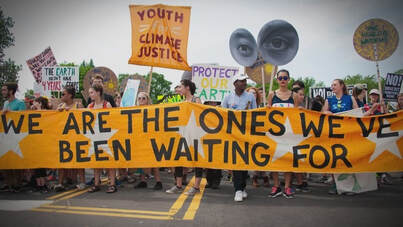
I think we've all heard shallow thoughts about the current state of youth, it's become sadly common to hear that "the youth of today" aren't interested in anything anymore but social media and Netflix. It's as if there had been the hippies, the youth of May 68, sexual liberation, the anti-globalization youth of the 1990s, and that today there was nothing left but idle youth who hopes for nothing and takes refuge in drugs and the virtual world. However, nothing is more false than this vision (caricatural, it is true).
I think we need to change our outlook on youth, we can no longer condescend to young people as a simple age category or the new generation who would have an adolescent desire to rebel. We must now see young people as a social class in their own right. It is an intellectual evolution that seems necessary to me in order to better take into account the needs and aspirations of today's youth and quite simply, it is by thinking in this way that we can best prepare our collective future.
Are young people really passive?
Against the tide of pessimistic and declinist discourse based on old patterns, young people are actually filled with optimism and the desire to change the world.
Indeed, a global study commissioned by the UN’s children’s agency, Unicef, appears to turn that received wisdom on its head. It paints a picture of children and young people believing that the world is improving with each generation, even while they report anxiety and impatience for change on global heating.
The results suggest the younger generation are more positive and globally minded than their elders, skeptical of what they read on social media (only 17 percent of young people said they trusted social media platforms “a lot” for information) and more invested in science and the possibility of global cooperation and international institutions. Millennials and Generation Z are born into a more digital, interconnected and diverse reality, they are optimistic about the future and keep strong expectations for the future.
Young people are often seen as having a bleak worldview, plugged uncritically into social media and anxious about the climate crisis, among other pressing issues. It is true that young people tend to vote less than other categories of the population and that pensioners are the most active in elections almost everywhere in Europe. If we look at this single fact, we can easily conclude that young people do not have a strong sense of citizenship, that they are hopeless about politics and do not want to engage in public life.
Youth today is also a product of the globalization and young people feel more international that never. The Maidan revolution in 2014 in Ukraine, or the recent pro-Europe protests in Georgia show us that young people from eastern Europe consider Europe as their future.
What is crucial to understand is that young people are different from their parents or their grandparents, it is not because they don’t have the same ways to engage than the previous generations that they are lazy. Young people have found new causes for which to engage. We can clearly see a renewal of the fight for gender’s equality since the #metoo movement, there is a new consciousness about the struggle against racism with the #BlackLivesmatter movement or a vital energy to act for the planet like showed us the Fridays for Future demonstrations. These new social movements gather young people about new thematic and have a different shape from the past social movements because they are the embodiment of the youth’s energy and will to change society. Also, on a conceptual plan, these new fights deeply question various foundations of our actual society, like the entrenchment of patriarchy, the voracity of the capitalist production system or the generalization of racism which has become systemic in our societies.
In the end, questioning ourselves about the current engagement of young people in society amounts to questioning their place in our society, their role and therefore their identity. In my opinion, being young today means above all being indignant against everything, wanting to question everything and rebuild everything. It's an uncontrolled energy, but it's not a posture, I think that the youth of the 21st century, unlike previous generations, does not only engage for ideological reasons, but for vital reasons.
